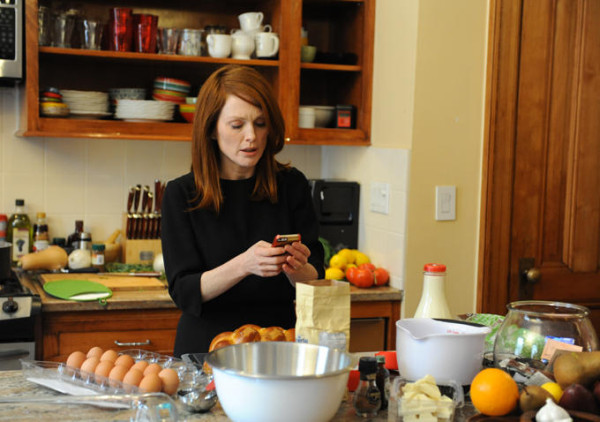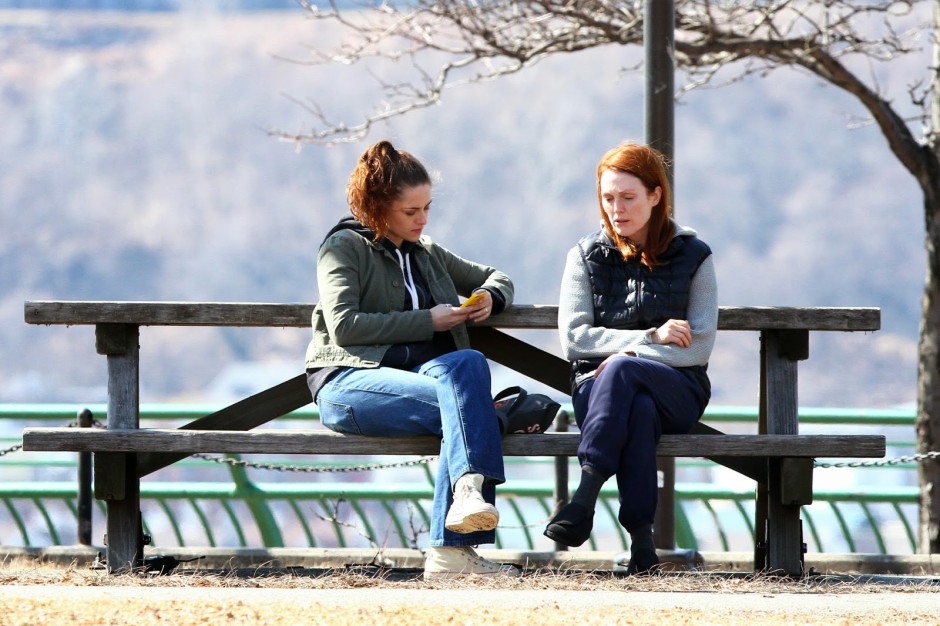Alice Howland (Julianne Moore) is in her prime as the first scene in Still Alice unfolds. Happily married, with three well-adjusted, adult children, she’s a successful academic at a major American university. And, at the age of 50, she looks great and can probably look forward to additional personal and professional milestones. As she and her family celebrate her birthday at a restaurant in New York City, she beams radiantly, all blissed out.
But life is unpredictable. At any second, it can take a sharp turn, leaving grief and sorrow in its wake. And this is the fate that awaits Alice, played mavellously by Moore, in one of her most glittering performances.

The first sign that something is amiss comes as Alice, a professor of linguistics at Colombia, delivers a lecture at the University of California in Los Angeles. It all goes well until she forgets a word. Alice makes light of it, turning a potentially embarrassing moment into an occasion for levity. To assure herself that her cognitive powers are intact, she plays a video word game. Much to her relief, she ends up with a good score. Alice is deluding herself. She’s ill, gravely ill.
Still Alice, which opens in Canada on January 23, charts her downward slide with precision and empathy. The directors, Richard Glatzer and Wash Westmoreland, portray her descent into the hell hole of Alzheimer’s with skill and sensitivity.
This film is bound to raise consciousness about a terrible, incurable disease, just as Billy Wilder’s The Lost Weekend (1945) highlighted the curse of alcoholism and Jonathan Demme’s Philadelphia (1993) underscored the ravages of AIDS.
Alice first realizes she’s fallen victim to Alzheimer’s when she gets lost while jogging in a familiar neighborhood. She consults a neurologist and he puts her through tests. It’s clear that Alice’s memory is failing her. Later, as she whips up a Christmas meal with her usual panache, she forgets an old and beloved recipe for bread pudding.
She’s relived to hear that an MRI scan and a blood test show no abnormalities, but she can’t escape her fate. The diagnosis from the physician is dire. He fears she may have early-onset Alzheimer’s. When Alice wakes up her husband (Alec Baldwin, in a fine turn) in the middle of the night to deliver the bad news, he fobs it off. “That’s completely insane,” says John, a scientist. “Memory lapses are normal.”

Alice isn’t as nonchalant. “My brain is fucking dying,” she cries. “And everything I worked for is going.”
Worse still, she discovers, her two daughters (played by Kristen Stewart and Kate Bosworth with gusto) and son (Hunter Parrish) may be carriers of this rare form of Alzheimer’s. She and John break it to them in an emotional meeting.
Meanwhile, reports submitted by her students sharply questioning the quality of her classroom lectures add to Alice’s sense of doom and insecurity. “I hate that this is happening to me,” she asserts, saying she’d rather have cancer.
Alice has her good days and bad days as the weeks and months pass. She compares herself to a butterfly, which has a brief, beautiful life. Moore is magnificent, the expressions on her face instantly telegraphing a range of emotions.
In one of the most remarkable sequences, she delivers a moving talk at an Alzheimer’s support group, expressing pain and anguish but reminding listeners that she lives in the moment and feels happiness and joy in the cocoon of her family’s warmth.
There are no panaceas or miracles in Still Alice, a movie imbued with dignity and strength. Disaster has struck and Alice is coping as best she can. But for all intents and purposes, she’s doomed.
